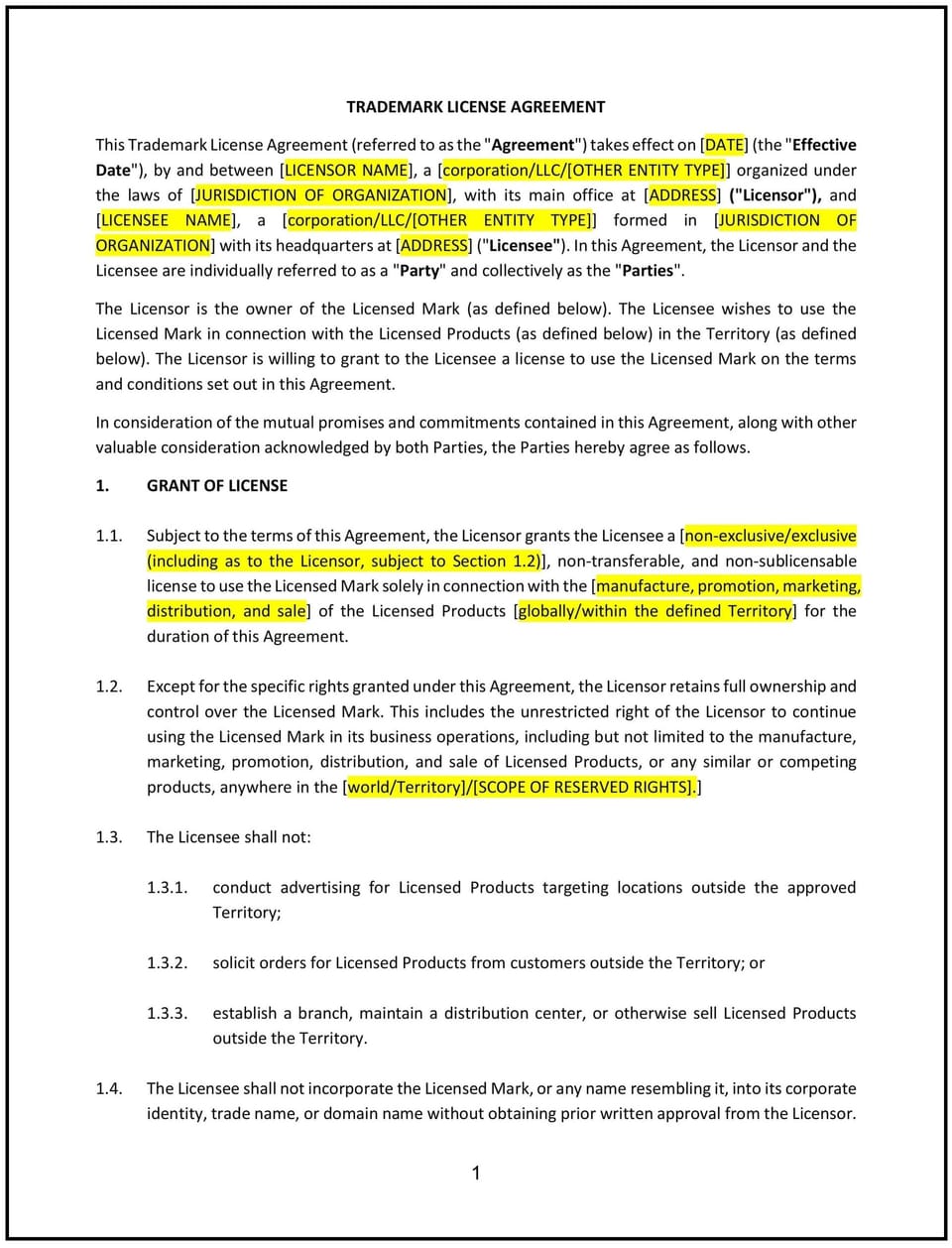Trademark License Agreement (Pro-Licensee) (Louisiana): Free template

Trademark License Agreement (Pro-Licensee) (Louisiana)
A Trademark License Agreement is a legally binding contract between a trademark owner (licensor) and a third party (licensee), granting the licensee the right to use the trademark under specific terms and conditions. In Louisiana, this type of agreement is commonly used in industries like energy, manufacturing, and retail to allow the licensee to leverage a well-known brand while generating revenue. A Pro-Licensee Trademark License Agreement prioritizes the licensee’s interests, ensuring flexibility and protection in the use of the trademark.
Louisiana’s strong energy and manufacturing sectors make trademark licensing an attractive option for businesses looking to expand their product offerings. However, licensees must ensure compliance with state-specific laws, such as Louisiana’s trademark registration requirements and consumer protection statutes. A well-drafted Trademark License Agreement protects the licensee’s interests and ensures clarity in the licensing relationship.
Tips for drafting and maintaining a Trademark License Agreement in Louisiana (Pro-Licensee)
- Define the scope of the license clearly: Specify the trademark(s) being licensed, the geographic area of use, and the products or services covered. For example, if the trademark is for a food product, outline whether the license applies to all food items or specific categories like snacks.
- Include flexibility in quality control provisions: Ensure the licensor’s quality standards are reasonable and achievable. For instance, negotiate the right to modify products or services to meet market demands without excessive restrictions.
- Address royalty payments: Negotiate favorable royalty rates, payment deadlines, and reporting requirements. For example, specify that royalties will be paid quarterly based on net sales.
- Include termination clauses: Specify the conditions under which the licensee can terminate the agreement, such as breach of contract or failure to provide adequate support. Outline any penalties or payments due upon termination.
- Comply with Louisiana laws: Ensure the agreement adheres to Louisiana’s trademark registration requirements and consumer protection statutes. This ensures enforceability and protects the licensee’s interests.
- Regularly review and update: Periodically update the agreement to reflect changes in the scope of the license, business needs, or legal requirements. For example, if the licensee expands into new product categories, amend the agreement to include these.
Frequently asked questions (FAQs)
Q: What should a Trademark License Agreement include in Louisiana?
A: It should include the scope of the license, quality control provisions, royalty payment terms, termination clauses, and compliance with Louisiana laws. Additionally, it should specify how disputes will be resolved.
Q: How does Louisiana law impact Trademark License Agreements?
A: Louisiana’s trademark laws emphasize the importance of proper registration and protection of intellectual property. Businesses must ensure the agreement complies with state registration requirements and consumer protection statutes.
Q: Can a Trademark License Agreement be terminated early in Louisiana?
A: Yes, if the agreement includes a termination clause, the licensee can terminate the contract with reasonable notice. The terms should specify any penalties or payments due upon termination, ensuring fairness for both parties.
Q: What industries commonly use Trademark License Agreements in Louisiana?
A: Industries like energy, manufacturing, retail, and technology frequently use Trademark License Agreements in Louisiana. For example, a food brand might license its trademark to a manufacturer, while a tech company might license its logo for use on accessories.
Q: How can businesses ensure compliance with Louisiana laws in Trademark License Agreements?
A: Businesses should ensure their agreements comply with Louisiana’s trademark registration requirements and consumer protection statutes. Regularly reviewing and updating the agreement is also essential to maintain compliance.
This article contains general legal information and does not contain legal advice. Cobrief is not a law firm or a substitute for an attorney or law firm. The law is complex and changes often. For legal advice, please ask a lawyer.


